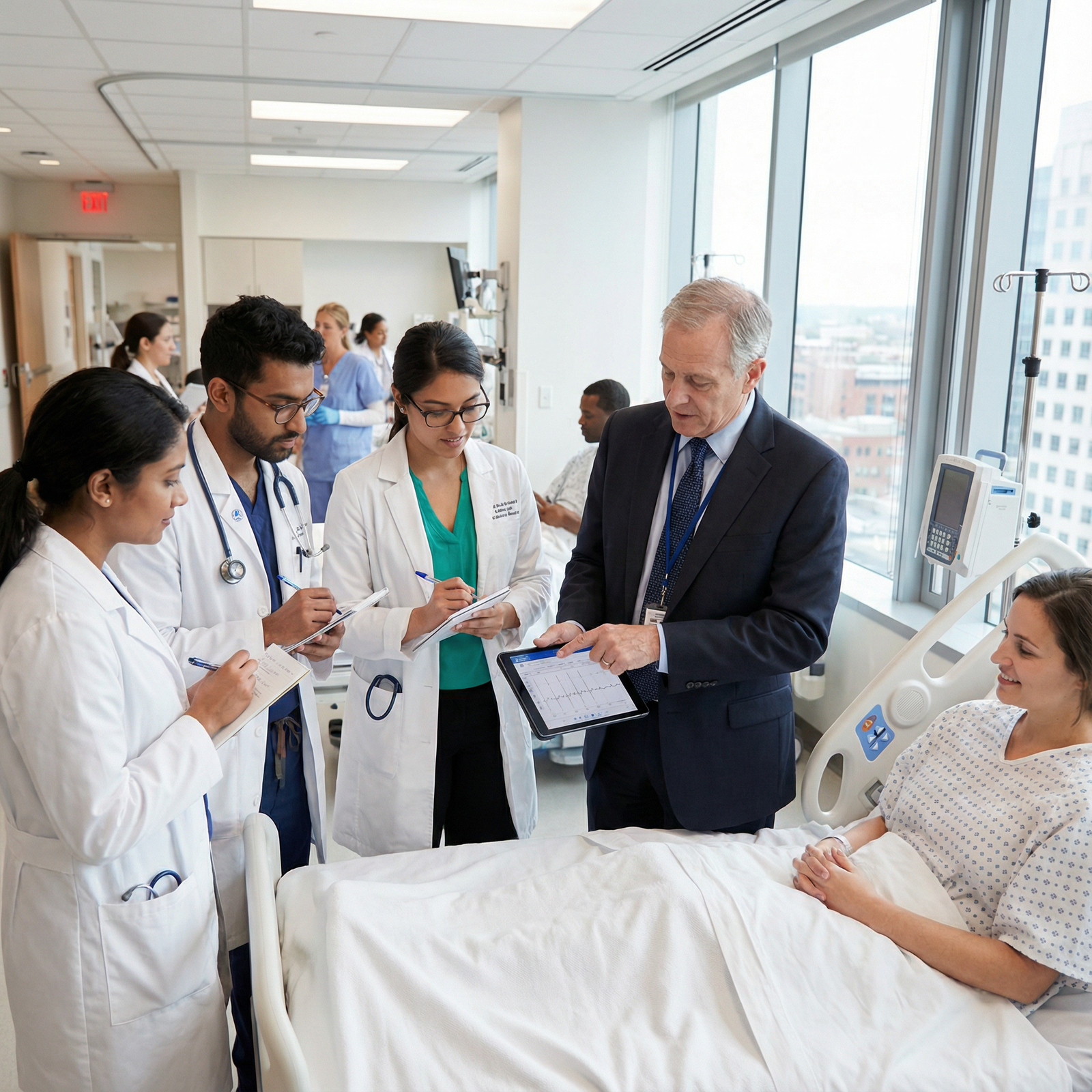
PhD vs. MD: Understanding the Key Differences and Career Outcomes
Introduction: Choosing Between Research and Clinical Practice
Deciding between a PhD and an MD is one of the most significant choices you can make in your healthcare career. Both pathways demand years of rigorous Education and training, but they prepare you for very different day-to-day work, lifestyles, and long‑term possibilities.
At a high level:
- A PhD (Doctor of Philosophy) is centered on creating new knowledge through research.
- An MD (Doctor of Medicine) is centered on applying existing and evolving medical knowledge to diagnose, treat, and care for patients.
Both are prestigious, both are challenging, and both can lead to impactful Healthcare Careers. Your decision should reflect not only your academic strengths but also your tolerance for uncertainty, your preferred working environment, and the kind of impact you want to make.
This guide walks through:
- The structure and expectations of PhD vs. MD programs
- Day‑to‑day work, lifestyle, and career paths
- Salary comparison and financial considerations
- How to decide which route—or combination—best fits your goals
Understanding the PhD Path in Health and Biomedical Sciences
What Is a PhD in a Healthcare Context?
A PhD (Doctor of Philosophy) is a research doctorate designed to train you as an independent investigator and scholar. While PhDs exist in many disciplines, in healthcare and medicine they often focus on:
- Biomedical sciences (e.g., immunology, neuroscience, pharmacology)
- Public health (epidemiology, biostatistics, health policy)
- Health services research and healthcare economics
- Biomedical engineering or informatics
- Psychology and other behavioral sciences
The core purpose of a PhD is to generate new knowledge—new data, new theories, new technologies, or new methods.
Key Characteristics of a PhD:
Research-Intensive:
You will spend most of your time designing studies, collecting and analyzing data, and interpreting results. Coursework is relatively front‑loaded; the bulk of the program is your dissertation research.Depth Over Breadth:
You become an expert in a very specific niche. For example, instead of “cardiology,” your expertise may be “molecular mechanisms of cardiomyocyte apoptosis in heart failure.”Long Duration and Variable Timelines:
- Typical duration: 4–7 years post‑bachelor’s degree
- Variation depends on discipline, project complexity, funding, and your progress
Dissertation Requirement:
You must complete an original research project (or series of studies), write a dissertation, and defend it to a committee of experts. This is the hallmark of the PhD.Funding and Stipends:
Many PhD programs, particularly in biomedical sciences and public health, provide:- Tuition coverage (full or partial)
- A living stipend
- Health insurance
In return, you may teach, work as a research assistant, or contribute to grants.
Typical PhD Training Pathway
Foundational Coursework (Year 1–2):
- Advanced statistics and research methods
- Discipline-specific classes (e.g., molecular biology, epidemiology, health policy)
- Responsible conduct of research and scientific writing
Lab Rotations and Advisor Selection (Often Year 1):
- Sample different labs or research groups
- Choose a primary advisor and project area
Qualifying or Candidacy Exams (Year 2–3):
- Written and/or oral exams
- Demonstrate mastery of core concepts
- Advance to “PhD candidate” status
Dissertation Research (Year 3–5+):
- Design and execute experiments or studies
- Publish in peer-reviewed journals
- Present at conferences
Dissertation Writing and Defense:
- Compile your findings into a cohesive document
- Defend in front of a committee
Potential Career Outcomes for PhDs in Healthcare
PhD graduates have a wide range of career options, both inside and outside academia:
Academic Institutions
- Assistant/associate/full professor
- Principal investigator (PI) running a research lab
- Teaching and mentoring students and residents
- Securing grant funding from NIH, NSF, or other agencies
Pharmaceutical, Biotech, and MedTech Companies
- Research scientist or senior scientist in R&D
- Clinical development roles
- Translational research connecting lab discoveries to clinical applications
Public Health and Policy Organizations
- Research analyst or senior scientist at:
- CDC, WHO, NIH, or ministries of health
- Think tanks and NGOs
- Work on population health, health policy, or global health initiatives
- Research analyst or senior scientist at:
Health Data Science and Consulting
- Data scientist or biostatistician at health systems or tech firms
- Healthcare strategy consultant (e.g., for payers, providers, life sciences)
Other Nontraditional Roles
- Scientific writing and medical communications
- Regulatory affairs
- Program leadership for foundations and nonprofits
Typical Salary Range for PhD Holders in Health-Related Fields:
- Early-career academic positions (postdoc, research scientist): ~$55,000–$80,000
- Assistant professor or industry scientist: ~$80,000–$130,000+
- Senior roles (full professor, director, VP in industry): can exceed $150,000–$250,000+
Income varies widely based on sector (academic vs. industry), geographic region, and leadership responsibilities.
Understanding the MD Path: Clinical Medicine and Patient Care

What Is an MD?
An MD (Doctor of Medicine) is a professional degree that qualifies you to practice as a physician. The MD pathway is centered on:
- Diagnosing and treating patients
- Applying evidence-based medicine
- Communicating with patients and families
- Collaborating with interprofessional healthcare teams
In the U.S. and many other countries, MDs (and DOs in the U.S.) are the primary clinicians providing direct medical care.
Key Characteristics of an MD:
Clinical Orientation:
The curriculum emphasizes:- Human anatomy, physiology, pathology
- Pharmacology and therapeutics
- Clinical reasoning and decision‑making
- Hands‑on patient care through clinical rotations
Structured Duration:
- 4 years of medical school:
- 2 preclinical years (classroom and simulations)
- 2 clinical years (rotations in hospitals and clinics)
- 3–7+ years of residency depending on specialty
- Optional fellowship for subspecialization (1–3+ additional years)
- 4 years of medical school:
Licensing Requirement:
To practice, MDs must:- Pass licensing exams (e.g., USMLE or equivalent in other countries)
- Complete residency training and obtain board certification in a specialty
Tuition and Debt:
Unlike many PhD programs, MD programs are often expensive:- U.S. medical school tuition commonly reaches $40,000–$70,000+ per year
- Many students graduate with six-figure debt
Scholarships, need-based aid, and service programs (e.g., NHSC, military) can offset costs.
Typical MD Training Pathway
Pre-Medical Education (Undergraduate or Equivalent):
- Complete prerequisite coursework (biology, chemistry, physics, math)
- Gain clinical exposure (shadowing, volunteering, scribing)
- Build a competitive profile (GPA, MCAT, research, leadership)
Medical School (4 Years):
- Preclinical Phase (Years 1–2):
- Systems-based curriculum (cardiovascular, pulmonary, renal, etc.)
- Laboratory sessions, standardized patient encounters
- Early clinical exposure in some programs
- Clinical Phase (Years 3–4):
- Rotations in internal medicine, surgery, pediatrics, OB/GYN, psychiatry, family medicine, emergency medicine, etc.
- Electives to explore specific interests or research
- Preclinical Phase (Years 1–2):
Residency (3–7+ Years):
- Full-time supervised clinical training in a chosen specialty:
- Primary care: internal medicine, family medicine, pediatrics
- Hospital-based: emergency medicine, anesthesiology, radiology
- Surgical: general surgery, neurosurgery, orthopedics, etc.
- Increasing responsibility and independence over time
- Full-time supervised clinical training in a chosen specialty:
Fellowship (Optional):
- Further subspecialization (e.g., cardiology, oncology, critical care)
- Additional advanced training and research opportunities
Potential Career Outcomes for MDs
MDs primarily practice clinical medicine, but their career scope is broader than many applicants realize.
Clinical Practice
- Primary care (family medicine, internal medicine, pediatrics)
- Medical subspecialties (cardiology, endocrinology, rheumatology)
- Surgical specialties (general surgery, neurosurgery, orthopedic surgery)
- Hospital-based specialties (hospitalist, anesthesiologist, emergency physician)
Academic Medicine
- Clinician-educator: teaching students and residents
- Physician-scientist: combining patient care with research
- Leadership roles (program director, department chair, dean)
Clinical Research and Industry
- Principal investigator in clinical trials
- Medical director at pharma or biotech companies
- Roles in medical affairs, pharmacovigilance, or clinical operations
Public Health, Policy, and Administration
- Health system leadership (CMO, medical director)
- Government agencies and NGOs (public health programs, policy development)
- Global health initiatives and humanitarian work
Typical Salary Range for MDs:
- Residents: ~$60,000–$80,000 per year (varies by year and location)
- Attending physicians:
- Primary care: ~$200,000–$260,000+
- Many specialties: ~$300,000–$600,000+
- Highly specialized or procedure-heavy fields (e.g., orthopedics, cardiology, neurosurgery) can exceed $600,000–$800,000+
Geography, practice model (academic vs. private vs. employed), call schedule, and productivity-based pay all significantly influence income.
Key Differences Between PhD and MD: Training, Expertise, and Daily Work
Education and Training Comparison
| Feature | PhD | MD |
|---|---|---|
| Primary Goal | Create new knowledge via research | Diagnose, treat, and care for patients |
| Duration | Typically 4–7 years post‑bachelor’s | 4 years of medical school + 3–7+ years residency |
| Curriculum Focus | Research methods, statistics, theory | Anatomy, physiology, pathology, clinical skills |
| Capstone Requirement | Dissertation based on original research | No formal dissertation; clinical rotations and exams |
| Licensure | No medical license required | Medical license and board certification required |
| Tuition and Funding | Often funded (stipend + tuition coverage) | Typically tuition-based; loans common |
| Post-Training Obligation | Optional postdoc (commonly 2–4 years) | Required residency and often fellowship |
Areas of Expertise and Day-to-Day Work
PhD Graduates:
Core Expertise
- Research design and methodology
- Advanced data analysis and statistics
- Deep understanding of a narrow domain
- Scientific writing and grant preparation
Typical Day
- Designing experiments or studies
- Analyzing data in software (R, Python, SAS, SPSS, etc.)
- Mentoring students and junior researchers
- Writing manuscripts and grant proposals
- Presenting at lab meetings and conferences
MD Graduates:
Core Expertise
- Clinical reasoning and decision-making
- Diagnosis and treatment based on evidence
- Communication with patients and families
- Navigating healthcare systems and teams
Typical Day
- Seeing patients in clinic or rounding in the hospital
- Reviewing labs, imaging, and consult notes
- Performing procedures or surgeries (depending on specialty)
- Coordinating with nurses, pharmacists, and other providers
- Documenting encounters and managing follow-up care
Career Outcomes and Salary Comparison
1. PhD Career Trajectories and Salary Expectations
Academic Research
- Postdoctoral fellow → assistant professor → associate professor → full professor
- Salary progression from ~$55,000–$80,000 (postdoc) to $100,000–$200,000+ in senior academic roles
- Highly dependent on grants and institutional support
Industry and Private Sector
- Scientist → senior scientist → director/VP of R&D or data science
- Starting salaries often $90,000–$130,000+, rising with leadership roles
- Opportunities for bonuses, stock options in biotech/tech sectors
Public Health and Policy
- Government or NGO roles with salaries often in the $70,000–$150,000+ range
- Emphasis on impact and mission; compensation varies by country and funding source
2. MD Career Trajectories and Salary Expectations
Clinical Practice
- Residency → attending physician
- Starting attending salaries commonly $200,000+, often rising to $300,000–$600,000+ with experience and productivity
Academic Medicine
- Salaries slightly lower than private practice but supplemented by:
- Protected research time
- Teaching responsibilities
- Leadership opportunities
- Salaries slightly lower than private practice but supplemented by:
Industry and Nonclinical Careers
- Medical director roles in pharma/biotech, digital health, health insurance
- Salaries often $220,000–$400,000+, sometimes higher in senior executive positions
Key Takeaway on Salary Comparison:
Across most scenarios, MDs earn higher average salaries and reach higher income levels more consistently than PhDs, especially in clinical practice. However, PhDs often have lower educational debt due to funded programs and can achieve strong compensation in industry and data science roles. Financially, MDs tend to “catch up” and surpass PhDs after residency, but the path involves more debt and longer mandatory training.
Job Market Trends and Stability
PhD Job Market
- Strong demand in:
- Biotech/pharma
- Health data science
- Public health and health systems research
- Academic tenure-track positions are highly competitive and limited
- Flexibility to pivot into industry, policy, consulting, and other roles
- Strong demand in:
MD Job Market
- Persistent and growing demand for physicians, especially in:
- Primary care
- Psychiatry
- Rural and underserved areas
- Specialty choice and location heavily influence job availability and compensation
- Automation risk is relatively low; the human and cognitive demands of medicine are difficult to replace
- Persistent and growing demand for physicians, especially in:
How to Choose: Aligning Your Strengths, Values, and Long-Term Goals

Key Questions to Ask Yourself
Do you want your primary impact to be on individual patients or on systems and knowledge?
- Prefer face-to-face patient care? → MD is likely a better fit.
- Prefer discovering mechanisms, testing interventions, or influencing policy? → PhD may align better.
What type of work energizes you?
- Enjoy long, focused projects, data analysis, and writing? → PhD
- Enjoy rapid problem-solving and interpersonal interaction? → MD
How do you tolerate uncertainty and long timelines?
- PhD research can be uncertain; experiments fail, grants get rejected, and timelines stretch.
- Clinical pathways are more structured, but patient outcomes can be unpredictable and emotionally demanding.
What are your financial constraints and priorities?
- PhD:
- Lower (or no) tuition
- Modest stipend during training
- More time spent at lower income levels
- MD:
- High tuition and debt
- Very high earning potential after residency
- More predictable financial trajectory once trained
- PhD:
How important is work-life balance to you, and at what stage?
- PhD:
- Can have long, intense hours around deadlines and experiments
- Some flexibility in schedule and remote work, depending on field
- MD:
- Demanding during medical school and residency (long hours, nights, weekends)
- Later career flexibility varies by specialty and practice setting
- PhD:
Considering Combined and Alternative Pathways
You are not strictly limited to choosing just one route. There are hybrid paths that merge strengths of both degrees:
MD/PhD Programs (Physician-Scientist Track)
- Integrated dual-degree programs (often 7–8 years)
- Typically funded (tuition + stipend)
- Designed to prepare physician-scientists who:
- See patients
- Lead research labs
- Bridge bench science and clinical practice (translational research)
- Ideal if you:
- Love both science and clinical medicine
- Want a career in academic medicine leading research programs
MD with Significant Research Experience
- Complete an MD and then:
- Pursue research fellowships
- Obtain a master’s or PhD later (e.g., in public health, clinical investigation)
- Focus on clinical trials, outcomes research, or quality improvement
PhD with Clinical Collaboration
- Stay research-focused but:
- Collaborate closely with clinicians
- Work in translational or implementation science
- Influence clinical practice guidelines and health policy
FAQ: Common Questions About PhD vs. MD in Healthcare
1. Can you pursue a PhD after obtaining an MD?
Yes. Many physicians choose to obtain a PhD or a research-focused master’s degree later in their careers, especially if they are drawn to academic medicine, clinical research, or health policy. Common scenarios include:
- MDs enrolling in PhD or DrPH programs in:
- Epidemiology
- Health services research
- Biomedical sciences
- MDs completing research fellowships that include formal coursework and advanced degrees
This pathway is more time-intensive but can position you for leadership roles in research-intensive departments or government agencies.
2. Is there a significant difference in job security between PhD and MD holders?
Generally, MDs have stronger baseline job security, particularly in direct patient care roles:
- Demand for physicians is consistently high, driven by:
- Aging populations
- Chronic disease burden
- Limited supply of trained doctors
For PhDs, security depends heavily on sector:
- Academia: Tenure-track positions are competitive, and funding is grant-dependent.
- Industry and public health: Job stability can be strong, especially in data science, biotech, and governmental roles, but can fluctuate with funding cycles and market conditions.
Overall, both can achieve stable careers, but the MD pathway offers more consistent demand.
3. Can you earn a PhD while practicing as a physician?
Yes, though it is demanding. Some physicians:
- Enroll in part-time or flexible PhD programs (often in public health, clinical research, or education)
- Take a dedicated research sabbatical or reduced clinical schedule
- Participate in structured “clinician-scientist” pathways that support degree attainment
These arrangements require careful planning with your institution and may extend your training but can significantly enhance your research skills and career options.
4. What type of financial aid is available for PhD and MD programs?
For PhD Programs (especially in STEM and health sciences):
- Tuition waivers
- Monthly stipends (assistantships or fellowships)
- Health insurance
- External fellowships (e.g., NIH F31, NSF GRFP, foundations)
For MD Programs:
- Need-based grants and scholarships
- Merit-based scholarships
- Federal and private student loans
- Service-based programs (e.g., National Health Service Corps, military scholarships) that exchange tuition support for service commitments
When comparing PhD vs. MD, consider not only tuition but also opportunity cost (years spent in training vs. earning a full professional salary).
5. How important is research experience when applying to MD vs. PhD programs?
For MD Programs:
- Research is a valuable differentiator, especially for competitive schools and specialties.
- However, clinical exposure (shadowing, volunteering, patient interaction) is typically more critical.
- Aim for at least some research experience if you’re targeting academic medicine or MD/PhD.
For PhD Programs:
- Research experience is essential.
- Admissions committees look for:
- Sustained involvement in labs or research groups
- Evidence of curiosity, initiative, and problem-solving
- Posters, presentations, or publications if possible
If you are undecided between PhD and MD, gaining both clinical and research experience as an undergraduate or post-bacc can clarify your interests and strengthen either application.
By understanding the training, daily work, salary comparison, and long-term trajectories of PhD vs. MD pathways, you can make a more informed decision about your future in healthcare. Whether you choose to discover new knowledge as a researcher, care for patients as a physician, or blend both paths as a physician‑scientist, each route offers meaningful ways to contribute to medicine and improve health at individual and population levels.

















